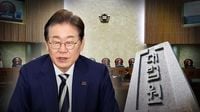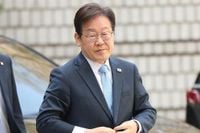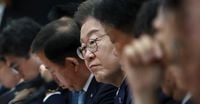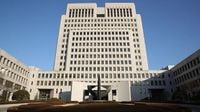The Supreme Court of South Korea is set to make a crucial ruling regarding former Democratic Party leader Lee Jae-myung's alleged violation of the Public Official Election Act. On April 22, 2025, the case was assigned to the Supreme Court's en banc session, which will deliberate the matter in full.
Chief Justice Cho Hee-dae determined that the en banc deliberation was necessary after consulting with other justices, indicating the case's significance. The en banc session includes Chief Justice Cho and 12 other justices, excluding the head of the National Court Administration. This move comes after Lee's appeal trial was initially assigned to a smaller division, comprising Justices Oh Kyung-mi, Kwon Young-jun, Eom Sang-pil, and Park Young-jae, with Justice Park as the presiding justice.
However, the assignment to the en banc session was made shortly after this initial allocation, highlighting the urgency and importance of the case. According to a Supreme Court official, the first hearing for this appeal is scheduled to take place on the same day, where the justices will discuss the direction and schedule of the deliberation.
Legal experts are interpreting the swift decision to refer the case to the en banc session in various ways. Some suggest that this indicates the high stakes involved, as it allows for a comprehensive gathering of opinions from all justices. Others view it as a strategy to avoid the implications of a guilty verdict.
In a notable development, Justice Noh Tae-ak, who also serves as the head of the National Election Commission, has requested recusal from the case due to potential conflicts of interest. This request raises questions about the integrity of the proceedings, as the head of the electoral body should not be involved in cases related to election law violations.
Lee Jae-myung's legal troubles stem from allegations made during the 2021 presidential campaign. He was indicted for making false statements regarding the late Kim Moon-ki, a former head of the Seongnam Urban Development Corporation, and for suggesting that the Ministry of Land, Infrastructure and Transport pressured him regarding land use changes in Baekhyeon-dong. The initial trial resulted in a one-year prison sentence with a two-year suspended sentence. However, an appellate court overturned this ruling, acquitting Lee on March 26, 2025.
The prosecution has since appealed the appellate court's decision, arguing that the ruling was disconnected from the general public's understanding of the law and misinterpreted the legal principles surrounding false statements under the Public Official Election Act.
As the Supreme Court prepares to hear the case, many observers are keenly aware of the implications this ruling may have on Lee's political future and the upcoming presidential election scheduled for June 3, 2025. Given the '633 principle'—which dictates that the first trial lasts six months, followed by three months for each subsequent trial—some analysts believe it is unlikely that a verdict will be reached before the election.
This situation is reminiscent of Lee's previous legal battles, including a 2020 case regarding alleged false statements about his brother's forced hospitalization, which was also reviewed by the Supreme Court's en banc session. That case resulted in a similar outcome, demonstrating the contentious nature of Lee's legal challenges.
As the first hearing unfolds, the legal community and the public alike will be watching closely. The decision made by the Supreme Court could not only affect Lee's political career but also set a precedent for how election law violations are adjudicated in South Korea.
In summary, the Supreme Court's decision to escalate Lee Jae-myung's case to the en banc session underscores the complexity and significance of the allegations against him. As the hearing progresses, it will be crucial to observe how the justices navigate the legal intricacies involved and what this means for the future of political accountability in the country.


![이재명 '선거법 재판' 대법원 전원합의체 회부…최종 판단 주목 [종합]](https://thumbor.evrimagaci.org/cWxv4yiBwjTAS6NSYPi_p4vpoT8=/200x0/tpg%2Fsources%2F5d73c6eb-1122-42f8-81ba-4edd87806a6e.jpeg)


